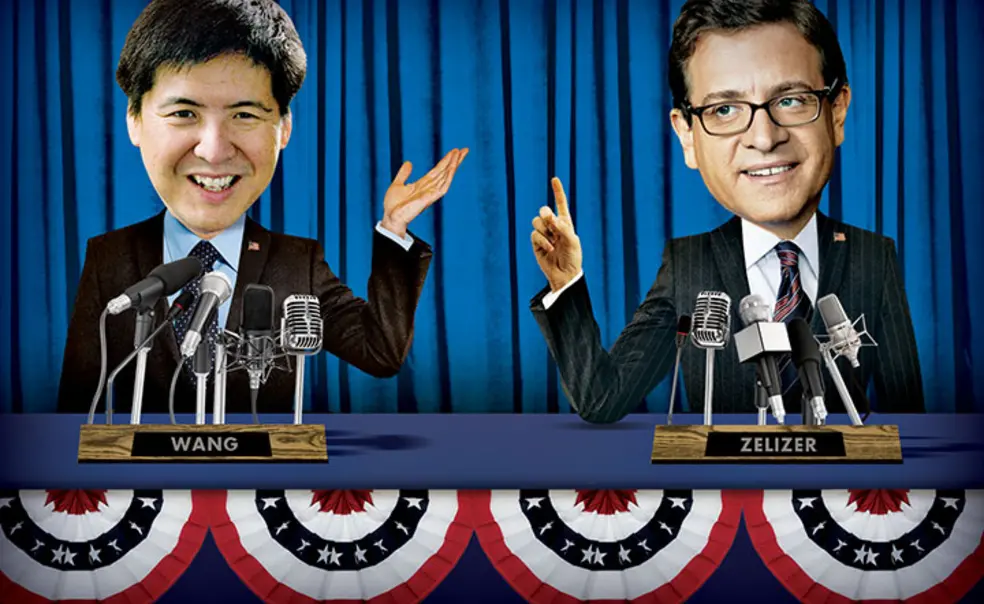Talking Politics
A neuroscientist and a political historian team up on an election-themed podcast
(This is a corrected version of an article that appeared in the Oct. 5, 2016, issue of PAW.)
Back in January, when Donald Trump’s run for president still seemed to many pundits like a curious sideshow, a Princeton neuroscientist posted on his blog that Trump likely would win the Republican nomination.
Professor Sam Wang typically spends his days in the lab using advanced optical and statistical methods to probe brain tissue, but in this post for election.princeton.edu, he analyzed aggregate poll data to draw a startling conclusion: “The only candidate with all No. 1 and No. 2 rankings is Donald Trump. Therefore, if 2016 were to follow the pattern of past elections, he would be the most likely nominee. After Trump comes Cruz, followed by Rubio as a long shot. Nobody else fits the pattern.”
The prediction was remarkable not just because “statistical politics” is a hobby for Wang or because his projection was denigrated two days later in a New York Times op-ed. It’s that, to Wang’s best knowledge, he was the only one getting it right at the time.
“I approach my blog by looking at the data without knowing anything about political science,” Wang says. “I take confusing data points and, if I synthesize enough of them, a coherent picture emerges. I view poll aggregation as a way of looking at the whole picture at once, something that experimental scientists have to do all the time, especially neuroscientists.”
He adds, “You can’t imagine how proud I am of myself about being right about Donald Trump.”
Yes, that was sarcasm. He’s funny, too.
It was that wry wit combined with statistical prowess that caught the attention of Julian Zelizer, a political historian at Princeton and a regular contributor to CNN.com. The two professors were on a panel convened by the Woodrow Wilson School earlier this year, and the chemistry was immediate.
“What I liked most was that each of us has a very different perspective on how to analyze contemporary politics,” Zelizer says. “I tend to look at history — big institutional trends — and he is a data guy; he looks at the aggregates of polls.”
That initial conversation was the genesis of a weekly election-themed podcast, “Politics & Polls,” distributed by the Woodrow Wilson School as a WooCast and available on iTunes and Soundcloud.
The production is bare bones: a 30-minute conversation recorded via Google Hangouts. It’s designed to emulate the informality of a chat on Prospect Avenue. “We treat this as an experiment and are letting it unfold,” Zelizer says. The podcast is at least partly responsible for the 30-fold increase in traffic on the blog since the 2012 election, with 100,000 visitors in July — and the numbers are expected to increase as the race continues.
Zelizer says the podcast provides a unique perspective on one of the most interesting and unpredictable election seasons in U.S. history. “The premise is that we take the qualitative guy and the quantitative guy and we bring them together,” he says. “There’s nothing else like that out there.”
Wang’s prediction for November? “Hillary Clinton will win the presidency. Her lead is unlikely to be reversed, and historically, opinion moves very little 60 days before the election,” he says, speaking in September. He adds that Democrats will likely take the Senate. “Democrats will win more votes nationwide in House races, but because of partisan gerrymandering, it is up in the air whether they will gain control.”
LISTEN to the Sept. 29 episode of Politics & Polls
For the record
The version of this story published in the Oct. 5, 2016, issue of PAW incorrectly reported that the podcast was unedited. The podcast’s name was also reported incorrectly.












No responses yet